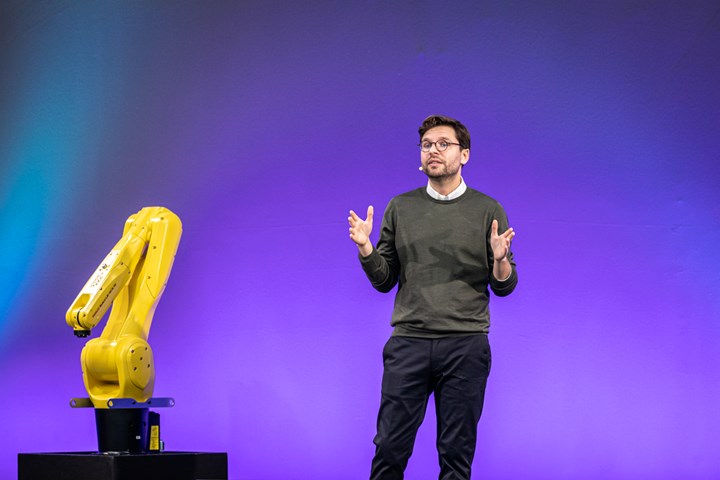Fairmat inaugurates Bouguenais carbon fiber recycling facility
Automated, industralized recycling of more than 3,500 ton of carbon fiber waste/per year in France, with expansion into the U.S. planned for 2023.
Fairmat (Paris, France) has opened a robotized plant near Nantes, France, to industrialize its “virtuous recycling” process, treating more than 3,500 tons of carbon fiber waste per year.
The Bouguenais plant applies the principles of smart manufacturing, relying on robotics and machine learning, which, combined with artificial intelligence (AI) algorithms, ensures absolute traceability and generates an understanding of the materials while continuously improving the process, according to the company. Fairmat plans to deploy more than one hundred robotic arms across the plant’s 4,000-square-meter area to implement the company’s proprietary recycling process. Robotics will enable the company to upscale its operations and treatment capacity.
The technology, which represents an investment of €7-8 million per year in R&D, also means Fairmat will be expanding its team, which currently numbers 80 people. Eventually, the Bouguenais plant will employ 400 people, the company notes. In addition, the facility’s development includes the implementation of a self-sufficient energy plan.
To better facilitate composites recycling, Fairmat cites that it has already signed approximately 30 contracts, including with companies Hexcel (Stamford, Conn., U.S.) for the recycling of carbon fiber prepregs, and Siemens Gamesa (Zamudio, Spain), which selected Fairmat for an R&D study on the recycling of carbon fibers in wind blades. Ultimately, these agreements have enabled the company to recover production scrap and industrial carbon fiber waste to create a responsible and sustainable material.
“Fairmat’s project goes far beyond the treatment of industrial waste.”
In its standard version “Fairmat Quest,” this new material is reported to be 10 times less expensive than new composites, significantly more resistant and twice as light as aluminum and saving on CO2. In addition to constituting as a genuine replacement for a range of materials — saving 15,000 metric tons of CO2 every year, according to a Greenflex life cycle analysis — the repurposed material, which has a lifespan of about 20 years, can be recycled up to five times without loss of performance, Fairmat says.
“We see the plant in Bouguenais [Loire-Atlantique] as a pilot site at the cutting-edge of recycling technology,” Fairmat CEO Ben Saada says. “We will follow this by deploying the technology in several countries, starting with the United States in 2023, then in a number of European countries.”
Saada is convinced that the use of recycled materials will also lead the industry to rethink manufacturing — for example, eco-design and product repairability. The idea is not only to substitute recycled materials for new ones, but to produce differently.
Fairmat intends to accompany its customers on this journey, with a “Fairmat Infinity” range — tailor-made products that adapt the characteristics of the material to specific needs. “Fairmat’s project goes far beyond the treatment of industrial waste,” Saada adds. “It’s about creating a new ecosystem with all our customers and partners.”
Related Content
-
Materials & Processes: Fibers for composites
The structural properties of composite materials are derived primarily from the fiber reinforcement. Fiber types, their manufacture, their uses and the end-market applications in which they find most use are described.
-
Carbon fiber in pressure vessels for hydrogen
The emerging H2 economy drives tank development for aircraft, ships and gas transport.
-
Recycling end-of-life composite parts: New methods, markets
From infrastructure solutions to consumer products, Polish recycler Anmet and Netherlands-based researchers are developing new methods for repurposing wind turbine blades and other composite parts.

















